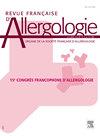Efficacy of low-dose IL-1 as an adjuvant in allergy immunotherapy
IF 0.3
4区 医学
引用次数: 0
Abstract
Prérequis/contexte
Allergen-specific immunotherapy (AIT) remains the only disease-modifying treatment for allergy, involving the gradual administration of allergens in escalating doses to desensitize the immune system. However, AIT is limited by long treatment duration, inconsistent efficacy, and the risk of adverse reactions. Various adjuvants are being developed to overcome these challenges.
Objectifs
We have previously shown that Interleukin-1 (IL-1) suppresses allergic responses. In this study, we investigated the potential of low-dose IL-1 as an adjuvant in AIT and compared its efficacy with that of monophosphoryl lipid A (MPLA), a detoxified carbohydrate-based Toll-like receptor 4 (TLR4) agonist with an immunostimulatory and safe profile.
Méthodes
Using an established mouse model of allergic anaphylaxis, female mice were sensitized to ovalbumin (OVA) and then treated with either IL-1/OVA or MPLA/OVA over short- and long-term protocols. Sensitization was assessed by measuring plasma levels of OVA-specific IgG1 and IgE, while allergic severity was assessed by mast cell protease-1 (mMCP-1) levels, body temperature drops, and clinical symptom scoring. Additionally, peritoneal mast cell receptor expression was assessed using flow cytometry.
Résultats/discussions
Our results showed that MPLA-treated mice exhibited increased allergic responses, whereas IL-1 treatment significantly improved clinical outcomes. IL-1 reduced the drop in body temperature, decreased clinical scores, and improved the IgG: IgE ratio by increasing OVA-specific IgG production. Furthermore, IL-1 upregulated the FcgRIIb: FceRI ratio on mast cells, indicating increased regulatory activity and attenuated mast cell degranulation. These findings demonstrate the ability of IL-1 to attenuate allergic responses and to deviate pathogenic IgE responses towards protective IgG responses while limiting mast cell degranulation, a key goal in AIT.
Conclusion
In conclusion, low-dose IL-1 shows potential as an effective adjuvant for AIT with improved immunomodulatory effects and safety compared to MPLA. These results pave the way for optimizing AIT strategies to develop more effective therapies for allergic diseases.
低剂量IL-1在过敏免疫治疗中的辅助作用
过敏原特异性免疫疗法(AIT)仍然是唯一一种治疗过敏原的治疗方法,它涉及逐渐增加过敏原剂量以使免疫系统脱敏。然而,AIT治疗时间长,疗效不一致,存在不良反应的风险。各种佐剂正在开发以克服这些挑战。目的我们之前已经发现白细胞介素-1 (IL-1)抑制过敏反应。在这项研究中,我们研究了低剂量IL-1作为AIT佐剂的潜力,并将其与单磷酰脂质A (MPLA)的功效进行了比较,MPLA是一种解毒的糖基toll样受体4 (TLR4)激动剂,具有免疫刺激和安全性。采用已建立的小鼠过敏性反应模型,将雌性小鼠致敏于卵清蛋白(OVA),然后在短期和长期方案中分别用IL-1/OVA或MPLA/OVA治疗。通过测量血浆中ova特异性IgG1和IgE水平来评估致敏性,而通过肥大细胞蛋白酶-1 (mMCP-1)水平、体温下降和临床症状评分来评估过敏严重程度。此外,使用流式细胞术评估腹膜肥大细胞受体的表达。研究结果表明,mpla处理的小鼠表现出增加的过敏反应,而IL-1处理显著改善了临床结果。IL-1减轻体温下降,降低临床评分,并通过增加ova特异性IgG的产生改善IgG: IgE比值。此外,IL-1上调肥大细胞上的FcgRIIb: FceRI比值,表明调节活性增强,肥大细胞脱颗粒减弱。这些发现表明IL-1能够减轻过敏反应,并使致病性IgE反应偏离保护性IgG反应,同时限制肥大细胞脱颗粒,这是AIT的关键目标。结论与MPLA相比,低剂量IL-1有可能成为AIT的有效佐剂,具有更好的免疫调节作用和安全性。这些结果为优化AIT策略以开发更有效的过敏性疾病治疗方法铺平了道路。
本文章由计算机程序翻译,如有差异,请以英文原文为准。
求助全文
约1分钟内获得全文
求助全文
来源期刊

Revue Francaise d Allergologie
Medicine-Immunology and Allergy
自引率
33.30%
发文量
349
期刊介绍:
La Revue Française d''Allergologie : un véritable forum pour faire connaître des travaux originaux et permettre la diffusion de l''information auprès de toutes les spécialités concernées par les pathologies allergiques. La Revue Française d''Allergologie (8 numéros par an) est au carrefour de nombreuses spécialités - dermatologie, pédiatrie, ORL, pneumologie, ophtalmologie, médecine interne - qui, toutes, ont à traiter des maladies allergiques. Les symptômes des allergies fondés sur des mécanismes communs sont le plus souvent associés et se succèdent chez un même patient. En forte progression depuis 20 ans, les maladies allergiques sont dans l''attente de perfectionnements et d''avancées thérapeutiques qui permettront aux nombreux patients qui en sont atteints de mieux vivre avec leurs allergies. La Revue Française d''Allergologie se veut donc un véritable forum de discussions et d''échanges entre tous les spécialistes confrontés aux pathologies
 求助内容:
求助内容: 应助结果提醒方式:
应助结果提醒方式:


